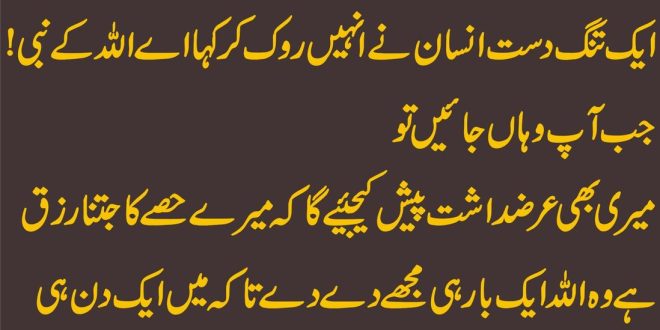At the same time as Hazrat Musa (a.s.) was born, two large tribes, the Copts and the Israelites, were living in Egypt. The Pharaohs, who were the rulers in Egypt, were Copts, but the Israelites were from the lineage of Ya’qub (Jacob), and had the name of Bani Isra’il. The original birthplace of the Bani Isra’il was Can’an, but after Yusuf (Joseph), from among these people, reached great rank in Egypt, they also came to Egypt and remained there. In the beginning, their number was not very great, but gradually they became more and more numerous until they became a social group in their own right, and they held great esteem.
But with the death of Yusuf, and also because of their inadmissible disobedience, they forfeited their esteem and glory. The Copts became their rulers and exploited them, and assigned arduous and difficult work to them, and did not hold themselves back from any kind of oppression and violence.
The monarch of Egypt, who was named ‘Pharaoh’ and was a Copt, had dipped his fingers in the blood of the Israelites and had so much power that fighting with him was out of the question. Due to excessive egotism he called himself ‘god’, and lead the people towards worship of him and to polytheism and idolatry.
Pharaoh was heedless of the fact that Allah was looking after the people with the light of His guidance, and he did not understand that it was the inveterate practice of Allah that whenever he set up a prophet, he delivered the people from ignorance, oppression and cruelty.
A soothsayer told Pharaoh that a child from Bani Isra’il would soon come into the world who would be a danger for his sovereignty. Pharaoh flew into a rage and gave an order without delay to cut off the head of every boy in Bani Isra’il, and to see that no male child remained to them.
In the middle of all this, Hazrat Musa (a.s.) was born.
When the fear of danger had gone, his mother, with all the love she had for him, placed her dear newborn baby into a box, according to Divine inspiration, and committed him to the waves of the river Nile, and the water took the box away with itself.
Pharaoh and his wife, at their residence on the banks of the Nile, were gazing into the river when they caught sight of the box with the infant, who was sleeping peacefully atop the troubled waves. When Pharaoh’s wife saw that child’s pure face, her heart was uneasy about casting him back into the river. She looked at him and liked him; her heart was seized with love for him, and she pleaded with Pharaoh to allow them to look after him in the palace and to consider him as their child. Pharaoh also became glad and hoped that his adopted child would one day be useful for him, and bring him some benefit.
The suckling infant would not accept to be breast-fed from any wet-nurse and this became a problem. In the end the mother of Hazrat Musa (a.s.), whose breasts were full of his milk, and who was looking for Musa came into the court of Pharaoh as a wet-nurse, took Musa to her bosom and suckled him.1
How amazing it seems – Pharaoh brought up his incomparable enemy in his own lap! And thus Hazrat Musa (a.s.) grew up and came to maturity, and God made him acquire his share of knowledge and wisdom. He saw all the oppression and injustice in Pharaoh’s cruel administration; but, not only did he not participate in it, but also he suffered from seeing the injustice, and began to look for a remedy.
One day, as he was walking along, he saw one of Pharaoh’s men struggling with a man of Bani Isra’il and tormenting him. As soon as the Israelite saw Hazrat Musa (as) he called him to help him. Musa rushed forward and struck the man of Pharaoh hard with his fist, and accidentally, as a result of his blow, the man died.

Hazrat Musa (a s) went far from that place, but the next day he again saw the same person from the previous day fighting with another of Pharaoh’s men. Again this man called for Hazrat Musa’s help, but Musa said to him angrily that he was a deluded person, i.e. that he was making a mistake by fighting with one of Pharaoh’s men every day, which was dangerous for everyone. Then he went forward and pushed him aside. The Israelite thinking that Musa wanted to hit him, shouted at him, “Do you want to kill me, like the man yesterday?”
After these events, Hazrat Musa (as.) was anxiously on his guard, but it became clear to Pharaoh’s people that the killer of that man was none other than Musa and therefore Pharaoh gave an order for the death of Hazrat Musa (as)
The officials began to hunt for Hazrat Musa (as) and he lived in fear and apprehension. A benevolent God-worshipper advised him that the sooner he left the town the better it would be, because the men of Pharaoh were seeking to kill him.
Unhappily, Hazrat Musa (a.s.) came out of Egypt and went towards Median, thus saving himself from the oppressors and seeking the friends of Allah
